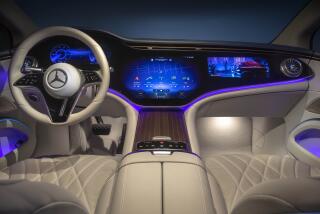2013 Honda Accord re-engineered into a well-rounded sedan
Honda’s nerds have done it. They’ve cracked the code, solved the riddle, unscrambled the jumble that, until now, has perpetually confounded a large swath of the automotive engineering teams around the globe.
What’d they figure out? A worthwhile transmission. A part of the car that’s traditionally as sexy as a pair of adult diapers. Yet it’s a part that contributes mightily to the overall excellence of the 2013 Honda Accord.
Honda’s venerable mid-size sedan has gone through a clean-sheet redesign that overhauled the car’s engines, transmissions, styling and size. The result is a well-rounded vehicle that starts at $22,470 and is sure to give a pile of headaches to competitors including the Toyota Camry, Volkswagen Passat, Chevy Malibu, Hyundai Sonata and even the excellent (and also recently redesigned) Nissan Altima.
Thank those lab-coated boffins.
The transmission in question is called a continuously variable transmission (CVT). Unlike a conventional automatic, it has no fixed gear ratios. Instead, you have basically one gear that keeps the engine running at its optimum revolutions per minute relative to the speed of the vehicle. The payoff is better fuel economy, and thus automakers are adopting them in droves.
Ah, but then there are the side effects. At cruising speeds, most CVTs keep the engine revving high, which means loud, which means annoying. Plus, when you mash the throttle to pass someone or merge onto the freeway, the transmission can’t downshift through the gears to give you more power. Thus, acceleration in a car with a CVT can feel leaden.
Yet for a mere $800 on Honda’s Accord LX and EX models, you can get a CVT that has all the fuel-friendly habits of its peers, with none of the vexing side effects. The smarts at Honda paired some hyper-capable software with a torque converter to create a gearbox that most drivers will never know is different from an automatic.
This matters because it contributes mightily to the quiet motoring of the 2013 Accord, which is closer to that of a luxury car than anything else in this segment. Not only does this new transmission keep the engine hushed at freeway speeds, but it conjures up the appropriate power when you need it, even from a dead stop. Only when you really put your foot down hard and keep it there does the engine get noisy.
The Accord’s upscale feel is aided by how solidly it feels put together. Over rough, clattering roads, this Honda barely bats an eyelash. The suspension is well balanced between being firm enough for confident road feel, and soft enough to keep your fillings in place when the potholes strike. There is some body roll through turns, but it’s well managed. The driver’s car in this segment remains the sporty Nissan Altima, but the mainstream bent of the Accord’s handling makes it a standout with broad appeal.
The Accord’s relative indulgence is further conveyed by its interior and exterior design.
The outside bears little resemblance to the previous Accord, as it does away with that model’s bulbous features and ill-chosen lines. This model is also 3.5 inches shorter despite interior dimensions staying nearly the same. The new look is cleaner and has a handsome, if somewhat generic, confidence to it. Chrome trim on the grille, door handles, exhaust tip and trunk deck lid lend an upscale air to the car.
The Accord’s cabin furthers the near-luxury inclinations. Road and wind noise is held at bay by active sound canceling via the stereo and thick, heavy doors that swing open wide in an earnest welcome. The seats are nicely bolstered, though covered in a patterned fabric that will be outdated by the time you finish this sentence. Other surfaces such as the dashboard and door panels are soft to the touch, and nothing feels cheap or compromised. Space in the cabin and trunk is average for this class.
The button-heavy approach to the Accord’s dashboard remains, but the controls for the climate control and stereo are now arranged in a more logical format. Above this is an 8-inch color screen standard on all Accords. It displays a backup camera (also gratis), stereo functions, trip information and, if equipped, the navigation system.
This screen also displays a nifty new safety feature Honda calls LaneWatch. It uses a small camera on the passenger’s side-view mirror to display two lanes of traffic to your right. The system activates automatically whenever the driver uses the right turn signal (which means it will never get used in Los Angeles), and it proved to be an eminently useful tool. Don’t be surprised if other automakers adopt similar systems.
Finally, to the left of the steering wheel sits a round, welcoming green button marked ‘ECON.’ Push it, and this Honda adjusts the throttle response and the air conditioning for an extra boost in fuel economy without neutering the Accord’s performance.
Even without the aid of our ever-mindful friend, this is an efficient car. Fuel economy is rated at 27 miles per gallon in the city and 36 on the highway; not the leader of the class, but certainly respectable. In my 200 miles of testing in mixed driving, I averaged 26 mpg.
Helping the Accord stay efficient is an all-new inline four-cylinder engine. It now features direct-injection and through 2.4 liters of displacement makes 185 horsepower and 181 pound-feet of torque. Its smooth power moves the Accord capably, and the car will do zero to 60 mph in 7.6 seconds, according to Motor Trend.
If you’re looking for an Accord that thinks outside of the four-cylinder-sedan box, consider the V-6 model with 278 horsepower for an additional $2,075 or the Accord Coupe that’s due soon. On the green front, a plug-in hybrid and regular hybrid will bow in 2013.
My four-cylinder test car was the mid-level EX model, and for $26,195 you get a moonroof, fog lights, power driver’s seat, the LaneWatch system, backup camera, dual-zone climate control, Pandora Internet radio, Bluetooth, keyless entry and alloy wheels. Safety on all Accords comes in the form of six air bags, stability control, anti-lock brakes with brake assist and a tire pressure monitoring system. This content and price matches the Accord squarely with its competitors.
Thus, not only do Honda’s pocket-protected poindexters get credit for cracking the CVT code, but the company’s designers, product planners and the good folks assembling the Accord in the company’s Marysville, Ohio, plant also deserve a nod for compiling the segment’s most well-rounded entrant. And they all did it without a single wedgie.
david.undercoffler@latimes.com







